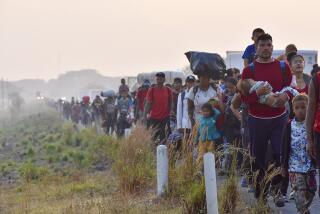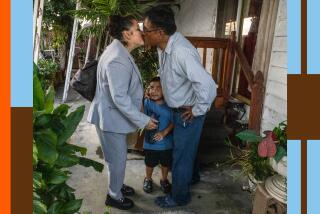In debt-plagued Greece, immigrants feel the heat
Reporting from Athens — Ancient Greece gave the world the word “xenophobia.” Modern Greece is providing examples of it.
Hamad Amiri, a young Afghan immigrant, arrived to work at his brother’s cellphone store in Athens on a recent morning only to find that someone had gummed up the lock overnight. Scrawled in yellow paint on the shop’s metal screen were the words “Foreigners Out,” accompanied by the insignia of a far-right organization known as Golden Dawn.
A few months before that, a group of tough-looking young men barged into the shop one evening and ordered Amiri to close up for the night. Not the Greek-owned businesses in the area, said Amiri, 22; just theirs. “They said, ‘If you don’t close, we’ll break everything.’ We were scared,” he recalled. “What else could I do?”
Amiri’s experiences are the result of a swelling tide of anti-immigrant feeling in this debt-plagued Mediterranean country.
Until about 20 years ago, Greek society was fairly homogeneous, bound by language, religion and a shared history extending thousands of years to the beginnings of Western civilization. But the nation’s face has changed dramatically in recent years. Immigrants, both legal and illegal, now account for as much as 15% of Greece’s population of 11 million, according to unofficial estimates.
To walk down some streets of Athens today is to hear snatches of conversation in Polish, Romanian, Russian, Arabic, Urdu and Bengali in the shadow of the magnificent ruins of the Parthenon.
Many of the newcomers arrived in search of refuge from political upheaval, starting with the Albanians who poured across the border by the thousands in the early 1990s to escape the death throes of communist rule in their homeland. More recently, Iraqis, Pakistanis and Afghans have found in Greece a haven from the ravages of war.
But the influx has fanned anger and fear not only among the avowed chauvinists of the far right, but increasingly among more moderate Greeks who view the strangers in their midst as importers of crime, squalor and distasteful habits.
Then too, the government is “at least 10 years behind other European countries” in establishing a legal infrastructure for dealing with the explosion in immigration, said Tzanetos Antypas, the head of Praksis, a rights organization here in the Greek capital.
Now, as Greece enters a period of painful economic retrenchment to alleviate its staggering debt crisis, Antypas fears the backlash against the country’s newest arrivals will only get worse.
“You can see it in the faces of Greeks; there’s a lot of uncertainty. They don’t feel secure in the whole environment, and of course they want to put the blame on someone,” Antypas said. “And who will be easy to blame? The immigrants.”
Athens and its environs, home to nearly one-third of all of Greece’s inhabitants, have witnessed a number of clashes in recent months pitting immigrants and their defenders against right-wing extremists.
The shop where Amiri works, not far from the heart of the Greek capital, sits on a square that has become a hot spot in the immigration battle. Many foreigners have moved into the neighborhood; some have found succor at the Greek Orthodox church that dominates the plaza, whose priest has often extended to homeless and hungry newcomers a helping hand out of a makeshift shelter in the basement.
But several months ago, the basement was damaged by a mysterious fire. Right-wing demonstrators -- called in, one resident said, by disgruntled Greek shopkeepers in the area -- protested outside the church, reportedly shouting abuse at the priest.
Members of the ultra-right Golden Dawn have tagged foreign-owned businesses with anti-immigrant graffiti, although in some cases their opponents have sneaked in behind them and, with a few judicious strokes of extra paint, altered “Golden Dawn” in Greek to read, nonsensically, “Golden Eggs.”
A playground next to the church was recently locked up, ostensibly for renovation but really, some people say, for fear of violence over the fact that foreigners and their children were hanging out there. Police officers patrol the square.
“I want the immigrants to leave and go home,” said one elderly Greek woman who lives in the area. She declined to give her name.
“Greeks don’t accept foreigners; I don’t know why,” said 60-year-old Anastasia Panopoulou, a homemaker who was out shopping in the square. “I don’t have a problem with them, because nothing’s happened to me. But I’m afraid, and I’m afraid for my children. . . .
“I don’t think Greece has space anymore,” she added. “We have far too much unemployment. So everybody suffers.”
Economics is one ingredient in the wave of anti-immigrant sentiment in Greece. Outright racism is another. As in other corners of Europe, religious prejudice is part of the brew, but hostility toward Islam and controversies over social issues such as head scarves for Muslim women don’t appear to play as big a role in the debate here as in countries such as France or the Netherlands.
The latest target of anti-immigrant ire is a government proposal to offer citizenship to children of non-Greek parents if they meet such requirements as having spent several years in Greek schools.
Rights groups laud the ruling Socialists for working to establish a coherent legal framework for immigrants.
Prime Minister George Papandreou said the bill, put forward last month, reflected Greek values of democracy and equality. Greek culture, he said, was threatened more by the hours spent by children in front of the TV every day than by the presence of immigrants.
But opposition parties denounced the plan. “Citizenship is not for free,” proclaimed a banner held aloft by demonstrators in Athens.
If it passes, the citizenship measure could affect as many as 80,000 people. Emmanuela Rapousi, 27, is one.
Rapousi was born in Albania but came to Greece as a wide-eyed 9-year-old, settling with her family on the island of Chios in the eastern Aegean Sea. Her father worked at an olive press, and she enrolled in the village school, adapting quickly to her surroundings even if she wasn’t always fully accepted: School authorities refused to let her wear Greek national dress along with the other children during traditional celebrations.
As an adult, Rapousi is eligible to stay on in Greece only under a work permit, as long as she holds on to her job as a graphic designer. Every two years, she submits to the cumbersome, costly and stressful process of renewing her permit.
Two-thirds of Rapousi’s life has now been spent in a country that still considers her a foreigner and that, at present, offers no way of slipping out from under the yoke of her outsider status.
“I feel Greek. I think in Greek. I have a Greek mentality,” she said. “Whenever I go to Albania to visit my grandmother or cousins, I feel like a foreigner, and they treat me as a foreigner.”
She hopes that one day soon she’ll be a full member of Greek society. “What I really care about is that I don’t have to live with the fear of being thrown out of my country. It’s like being thrown out of my home.”
More to Read
Sign up for Essential California
The most important California stories and recommendations in your inbox every morning.
You may occasionally receive promotional content from the Los Angeles Times.











